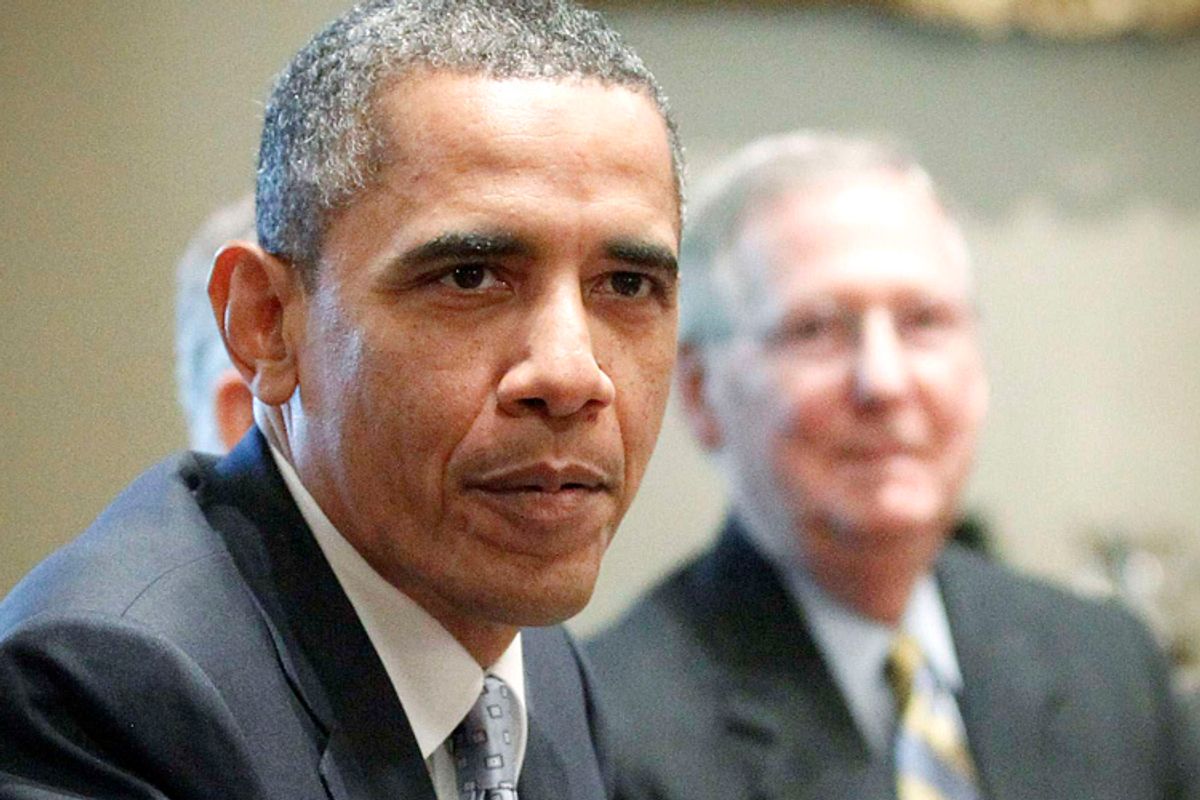In an interview with GQ a few years ago, then-White House press secretary Robert Gibbs name-checked some of President Obama’s favorite political commentators. It was a dispiriting list – David Brooks and Tom Friedman, for example, made appearances. One of the more obscure names on the list was that of Gerald Seib, the Wall Street Journal’s Capital Journal columnist.
Seib is a quintessential Beltway type – a bland centrist for whom “bipartisanship” and “compromise” are laudable goals in themselves, and a consistent mouthpiece for center-right policies like social insurance cuts and “tax reform.” He’s also a dogged believer that with a little goodwill and determination, Obama and his congressional Republican antagonists will find a way to get along and achieve said center-right policies.
Accordingly, Seib argues in his column today that a Republican takeover of the Senate could actually be good news for Obama. Seib doesn’t make the asinine case that Democrats should throw the Senate to the GOP, the better to expose Republicans as obstructionist policy nihilists, foment mass discontent with the party, and thereby ensure an easy victory for Hillary Clinton in 2016. No – Seib actually believes that a Republican Senate could usher in a new era of bipartisan cooperation.
If Republicans win Senate control, Seib reasons, “they also have an equal share of responsibility for what does and doesn’t get done,” so the party will want to show it’s capable of governing ahead of 2016. And given that “eras of evenly divided power” have often been “among the most productive,” might the ice finally break among Obama, Mitch McConnell, and John Boehner?
Well, no. While the chattering class bemoans “gridlock” and “polarization” in Washington, political scientists have shown that what we’re actually confronting is a problem of asymmetric polarization – congressional Republicans have moved much further to the right, while Democrats have barely moved to the left. The GOP hasn’t been intransigent on economic stimulus, unemployment benefits, immigration reform, climate change, or any other issue because it’s waiting for the right conditions to emerge before the party can begin cooperating with Obama. The GOP has been intransigent because its lawmakers genuinely hold hard-right positions on those issues.
Seib makes sure to add the necessary caveats – there would be inevitable spats between the administration and a unified GOP Congress, the Senate would join the House in launching anti-administration investigations, and so on. But, he writes, “substantive achievement can and does emerge from tension”:
To see how, merely look at the presidency of Bill Clinton, which Democrats remember fondly. Some of Mr. Clinton’s most notable achievements—a balanced budget, a welfare overhaul, badly needed changes to telecommunications law, a revamping of tax rates—took place when the Senate was in Republican hands.
Given that the GOP Congress Clinton dealt with wasn’t nearly as far to the right as the Boehner-McConnell Republicans, it’s largely a moot point. Still, Seib’s unquestioning applause for such “notable achievements” as savage cuts to public assistance, deregulation, and tax reforms that included a cut in the capital gains rate offers illuminating insight into the Villager worldview.
Two decades later, Seib holds out hope that Obama and a GOP Congress may yet herald a new era of bipartisan cheer. He points specifically to an “overhaul of the immigration system and a revamping of the tax code, at least the corporate tax.” As Jonathan Chait notes, Seib never explains how Republican control of the Senate would move the needle on these issues.
Nevertheless, Seib is pretty sure that bipartisanship could still make a triumphant comeback. Perhaps Obama read this rose-colored take from one of his favorite columnists and thought it all seemed rather familiar. Perhaps he recalled Seib’s 2010 assessment that Mitch McConnell was sounding a “softer tone” after his earlier statement that defeating the president was his top priority. Perhaps the president thought back to Seib’s column just before Obama’s second inauguration, in which the columnist contended that the GOP’s drubbing in the 2012 elections “smoothed the political path for an [immigration] overhaul” by waking Republicans up to their problems among Latino voters. Or perhaps Obama recollected a Seib column written just after that election, when Seib wrote that despite structural challenges, “a bipartisan group of Senators” could soon come together to forge a grand overhaul of the tax system.
A rusty old cynic -- or, say, an observer of political reality -- might respond that Seib's great bipartisan dreams will once again be dashed. If there’s any comfort for the columnist, though, it’s in his sure and certain knowledge that President Hillary and Speaker Paul Ryan will finally break Washington’s fever come January 2017.



Shares